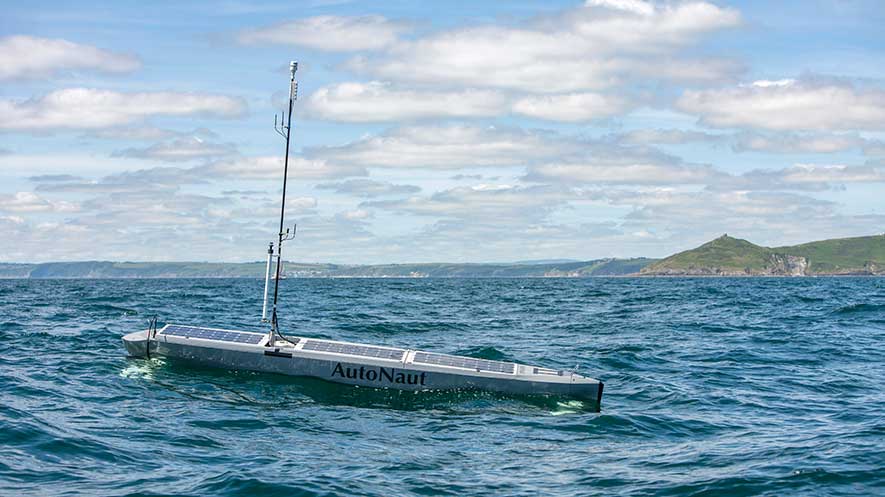A pioneering project to find out how increasing levels of man-made noise in the sea is affecting marine life has begun in Plymouth.
Plymouth University Marine Institute scientists are working with AutoNaut and its 5m unique wave-propelled unmanned surface vessel (USV), which tows a Seiche Ltd passive acoustic monitoring (PAM) array. This cutting edge technology enables the gathering of essential underwater sound data that is both high quality and cost-effective.
Dr Clare Embling and Dr Simon Ingram, both lecturers within the School of Marine Science and Engineering and experts in marine mammal biology and bio-acoustics, are the academic leads in the project.
“Human noise in the sea is of growing environmental concern due to its potential negative impacts on marine life,” Clare said. “Increasing levels of shipping and marine development raise noise levels in the sea and can make it more difficult for animals to communicate, and can displace animals from important feeding or nursing grounds and sometimes even cause physical injury.”
“Yet, we know very little about the noise levels in our seas,” added Simon. “The AutoNaut is a quiet autonomous platform that allows us to monitor noise levels as well as the sounds produced by marine life, such as the whistles and clicks of dolphins and porpoises over very large areas and long periods of time. This information will be invaluable for assessing how marine noise affects marine life.”
Two days of initial trials of the autonomous concept were completed successfully in July, led by the companies, who both have bases in Devon. “Our new 5m AutoNaut towed the array quite comfortably in light conditions,” said Mike Poole, Director of AutoNaut Ltd which manufactures the storm-proven autonomous boat. “Speed was reduced by drag, as you would expect, but steering and performance were not affected. We piloted AutoNaut remotely from our Chichester base and the AutoNaut can readily stay at sea for months while being piloted from the shore.”
Roy Wyatt, MD of Seiche Ltd, said: “The PAM data we gathered on background sound in the English Channel will undergo a technical analysis to scope noise levels. The really exciting feature of AutoNaut here is that it is near silent – a key attribute for such listening roles.”
A further step is to combine with Seiche’s capability to transmit full, raw audio signal from an at-sea platform. This raises the clear possibility of 24/7 real time remote monitoring by trained operators positioned safely on land.
Seiche manufactures a range of underwater acoustic monitoring equipment from research level data recorders to high performance digital arrays for defense applications. A new digital array will be deployed from another AutoNaut later this year as part of the NATO’s ‘Unmanned Warrior’ exercise, with the aim of detecting submarine activity.
Measuring noise in the oceans is an expensive business, either from specialist vessels, or drifting buoys, or hydrophones fixed to installations. By making the operation autonomous - piloted, monitored and analyses from ashore - it should be possible to gather much more data over long periods very cost effectively.
This project is the first fruit of a partnership agreed in January between Plymouth University and AutoNaut. It gives the University access to the new disruptive autonomous technology embodied in AutoNaut and Seiche’s PAM.
“Using autonomy in this way keeps people out of danger,” Mike Poole said. “It makes it possible to gather all kinds of data about our seas in new ways. Our company gains by working with the University, and the University benefits through its involvement with some of the most innovative and entrepreneurial small businesses in the UK and their pioneering autonomous applications.”





